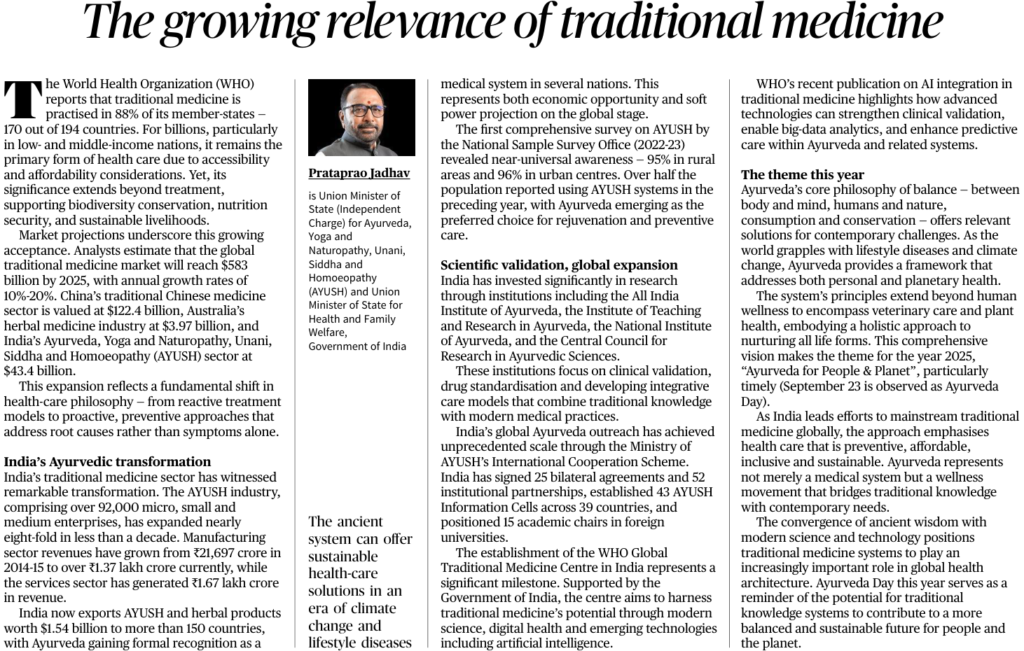

The editorial of The Hindu titled “The growing relevance of traditional medicine” by suggests that traditional medicine (like Ayurveda) is gaining global relevance by integrating with modern science and technology to address healthcare needs.
While challenges exist in standardization, safety, and quality control, the unique chemical diversity of natural products offers a vast resource for drug discovery, and traditional systems provide accessible care, especially in rural areas, contributing to a more sustainable and comprehensive global health landscape.
The article concludes that, particularly Ayurveda, is undergoing a global resurgence driven by a demand for preventive, sustainable, and holistic healthcare. This revival positions India as a leader in integrating traditional knowledge with modern approaches to create accessible and sustainable healthcare.

According to the World Health Organization (WHO), traditional medicine is practiced in 88% of its member countries – that is, in 170 out of 194 countries.
Analysts estimate that the global traditional medicine market will reach $583 billion by 2025, with annual growth rates of 10%-20%. China’s traditional Chinese medicine sector is valued at $122.4 billion, Australia’s herbal medicine industry at $3.97 billion, and India’s Ayurveda, Yoga and Naturopathy, Unani, Siddha and Homoeopathy (AYUSH) sector at $43.4 billion.
The AYUSH industry, comprising over 92,000 micro, small and medium enterprises, has expanded nearly eight-fold in less than a decade. Manufacturing sector revenues have grown from ₹21,697 crore in 2014-15 to over ₹1.37 lakh crore currently, while the services sector has generated ₹1.67 lakh crore in revenue.
India now exports AYUSH and herbal products worth $1.54 billion to more than 150 countries, with Ayurveda gaining formal recognition as a medical system in several nations.
The first comprehensive survey on AYUSH by the National Sample Survey Office (2022-23) revealed near-universal awareness — 95% in rural areas and 96% in urban centres.
India has invested significantly in research through institutions including the All India Institute of Ayurveda, the Institute of Teaching and Research in Ayurveda, the National Institute of Ayurveda, and the Central Council for Research in Ayurvedic Sciences.
The theme for the year 2025, “Ayurveda for People and Planet”, presents a comprehensive vision that is particularly timely (September 23 is celebrated as Ayurveda Day).

01AYUSH |
AYUSH is an acronym for traditional and alternative systems of medicine practiced in India. It was established as a government department in 1995 and elevated to its own ministry in 2014 to promote these practices. The systems included in AYUSH are: Ayurveda, Yoga & Naturopathy, Unani, Siddha, Sowa-Rigpa (Traditional Tibetan Medicine), Homeopathy.
Integration and healthcare initiativesAyurvedic packages in AB-PMJAY: Ayurvedic packages have been reviewed for inclusion in the Ayushman Bharat–Pradhan Mantri Jan Arogya Yojana (AB-PMJAY) to integrate Ayush treatments into mainstream healthcare. As of September 2024, 170 packages were finalized, with plans for further expansion. Ayush Holistic Wellness Centres: An Ayush centre was inaugurated at the Supreme Court of India in 2024 through an MoU with the All India Institute of Ayurveda (AIIA). Geriatric care: In 2024, the Ministry surpassed its 100-day target by organizing 14,692 Ayush camps for elderly citizens nationwide. Nutritional support: An MoU with the Ministry of Women and Child Development (WCD) was signed to use Ayurvedic interventions to combat anemia among adolescent girls. Special medical stores: The government announced plans to open special medical stores at the tehsil level to ensure easy access to Ayush medicines for all citizens.
Research, Education, and InfrastructureNew institutions: In 2024, Prime Minister Narendra Modi inaugurated the Central Research Institute of Yoga & Naturopathy (CRIYN) in Jhajjar and laid the foundation for two more CRIYNs in Odisha and Chhattisgarh. Ayush Centres of Excellence: Six new Centres of Excellence were launched with a funding of ₹52.47 crore, partnering with institutions like IISc Bangalore and IIT Delhi for advanced research. “One Herb, One Standard” initiative: A historic MoU was signed in August 2024 to standardize herbal medications, improving the safety and quality of traditional medicines. AIIA Phase II: In October 2024, Phase II of the All India Institute of Ayurveda (AIIA) was inaugurated in New Delhi, expanding its capacity for research and treatment.
International Collaborations and RecognitionWHO agreements: In July 2024, the Ministry signed a donor agreement with the World Health Organization (WHO) to provide $85 million over 10 years for the Global Traditional Medicine Centre (GTMC) in Jamnagar, Gujarat. In May 2025, a new agreement initiated the development of a Traditional Medicine module under the International Classification of Health Interventions (ICHI). Expansion in ICD-11: The WHO’s ICD-11 classification now includes data and terminology related to Ayurveda, Siddha, and Unani medicine. This will help standardize India’s traditional medicine systems within the global healthcare framework. Bilateral and institutional MoUs: The Ministry has signed multiple agreements to promote traditional medicine globally. Notable examples in 2024 and 2025 include:
Outreach CampaignsAyurveda Day: The 10th Ayurveda Day was celebrated in September 2025 under the theme “Ayurveda for People & Planet”. The 2024 event, themed “Ayurveda for Global Health,” saw participation from over 150 countries. International Day of Yoga (IDY): The 10th IDY in June 2024, themed “Yoga for Self and Society,” involved over 24.53 crore people globally and included special promotions through Common Service Centres. “Har Ghar AyurYog”: This campaign, launched in 2024, promotes the adoption of Ayurveda and Yoga in communities across India. “Desh Ka Prakriti Parikshan Abhiyan”: A nationwide campaign launched in 2024 aims to raise health awareness and promote preventive healthcare based on Ayurvedic principles, mobilizing 4.7 lakh volunteers. |
Author: currentaffairs4upsc
UPSC


